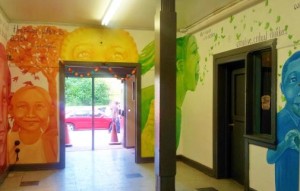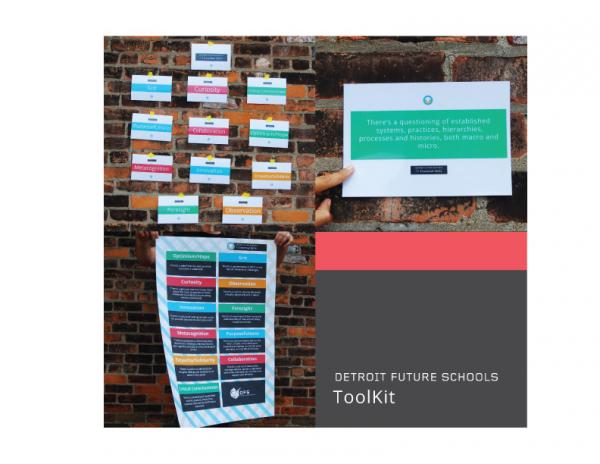Detroit Future Schools is going into its third year of programming and we could not be more excited! We have learned so much from the past two years of integrating digital media arts into Detroit schools and providing year-long teacher professional development in more than 24 schools across the city. Two things have become clear to us:
1) It is possible to transform classrooms into learning communities that advance our full human potential. 2) The inputs required to make this transformation happen are relatively simple.
DFS has honed a set of instructional practices that when applied consistently have proven to create the conditions in which humanizing education can thrive. We measure humanizing education by the presence or absence of 11 Essential Human Skills within a classroom, such as critical consciousness, metacognition, and curiosity. We look for these skills in teachers as well as students.
As classrooms are the cells in the body of our school system, we believe that transformation in education at this level has the potential to transform entire schools, and ultimately, the education system as a whole.
As we enter the 2013-2014 school year, we have re-structured our program to have greater impact in a smaller number of schools. We are excited to announce the following new features of Detroit Future Schools:
ANCHOR SCHOOLS
 In two years, DFS has been welcomed into 24 schools across the Metro-Detroit area. This year, we made the decision to only work in four schools: The James and Grace Lee Boggs School, Hamtramck High School, Tri-County Educational Center, and Henry Ford Academy: School for Creative Studies.
In two years, DFS has been welcomed into 24 schools across the Metro-Detroit area. This year, we made the decision to only work in four schools: The James and Grace Lee Boggs School, Hamtramck High School, Tri-County Educational Center, and Henry Ford Academy: School for Creative Studies.
This decision was made in part because the two-year, non-renewable federal grant under which we launched Detroit Future Schools ended in 2012. While we were successful in securing contracts to continue DFS in six schools, we decided to work only in the four schools where we see potential for long-term partnership. Administrators at all four of these schools deeply understand and appreciate the vision of DFS and will work with us to generate the funds necessary to sustain the program in their schools moving forward.
We look forward to being able to have a more concentrated impact in a smaller number of schools. At the same time, we plan to create more local and national spaces through which to share the lessons emerging from the in-school program. Ultimately, we believe this scaling-down-to-go-deep approach will strengthen the root system of DFS for the long-term.
ZINE AND TOOLKIT
We are committed to an "open source" approach to humanizing education that will allow the maximum number of people to benefit from the practices and ideas that emerge from our anchor schools. Towards this goal, Detroit Future Schools produced a zine that any teacher, youth or artist in schools can use to integrate the spirit and practices of DFS in their own learning space. The zine includes theDFS Vision Statement and theoretical framework, instructional videos, evaluation templates, and lesson plans.
To accompany this zine we created a toolkit of classroom signage that is essential to the implementation of DFS practices. This toolkit includes: an 11 Essential Skills Poster, a Media Project Workflow Poster, Detailed DFS Timeline for the Year. 11 Essential Skills cards, Debate Signs and Rules, Bloom’s Taxonomy, and a Day One DFS Handout.
RIDA INSTITUTE
For the 2013-2014 school year we will provide more opportunities for educators outside of our Anchor Schools to receive professional development training in DFS core practices.
In February of 2014, DFS will invite educators from across Detroit and the country to participate in the "RIDA Institute" – an intensive three day crash-course in reimagining what is possible within schools. The question “what is the purpose of education?” will frame the institute, as participants explore the educational theories of Paolo Friere, Duncan Andrade, James and Grace Lee Boggs and others.
Moving from theory to practice, RIDA Institute participants will think critically about the specific social and historical contexts in which they work in order to create their own purpose of education statement. From there, they will use the DFS RIDA framework to create visions for their classrooms and the kind of students they will produce. We will share instructional practices for integrating the 11 Essential Skills into classroom content, as well as daily practices for making lesson-planning more efficient and effective.
Participants will have the opportunity to design and refine lesson plans over the course of 3 days, returning to their purpose of education statement to evaluate what instructional practices best allow them to fulfill that purpose. The RIDA Institute will take place in February 2014.
Because space is limited, participants in the institute will be selected through an application process. Enrollment fees will be determined on a sliding scale for individuals and institutions. Contact ammerah@alliedmedia.org for more information.
★ ★ ★ ★ ★ ★ ★ ★ ★
Keep us going and growing: Sign-up to be an AMP sustainer!

